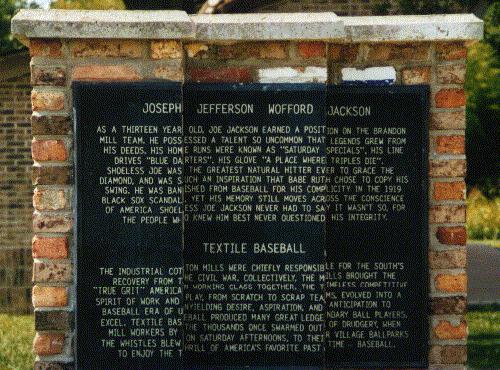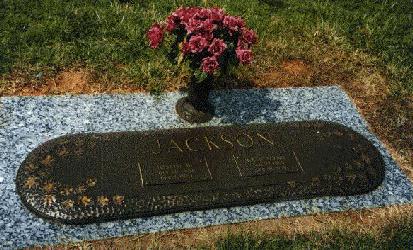This Man Should Be in the Hall of Fame

Joseph Jefferson Wofford Jackson
16-Jul-1889 - 5-Dec-1951

The record shows that the 1919 World Series belongs to the Cincinnati Reds, having defeated the Chicago White Sox, five games to three.
The record also shows that one of the White Sox, a Greenville, S.C., native named Joe Jackson, hit .375 in the series.
Unfortunately, Jackson, a lifetime .356 hitter whose stance was copied by many, including Babe Ruth, does not occupy a place of honor at the National Baseball Hall of Fame and Museum in Cooperstown, N.Y.

Many are familiar with the saga of "Shoeless Joe" thanks to the book and movie Eight Men Out from the late 1980s. Eight key White Sox players, including several pitchers, were approached by Chicago gamblers and offered money to throw the Series to the Reds. We're talking big money: in several cases, as much as or more than the players made in salary for the season.
Jackson wanted no part of the slush fund. His play proved it. Christy Mathewson, the great New York Giants pitcher whose playing career was over thanks to an injury from the World War, commented in the press box that something was amiss with the Series. He knew, though, that Jackson had not taken part.
The courts agreed. Jackson was acquitted in mid-1920 of all charges in association with the Series gambling scandal. One would think this might clear the way for Jackson to finish his illustrious career with the grace with which he had played it.
However, baseball's owners knew the game's integrity had been compromised. They found a federal judge, Kenesaw Mountain Landis, who would be willing to step down from the bench and assume the newly created post of Commissioner of Baseball.
Landis, a conservative from Kentucky, helped nurse the game back into shape. He was guilty, though, of several crimes against the game. For one, he held firm to the 1887 "color line" that kept the black man out of organized baseball until his death in 1945. For another, he went against the courts' finding and banned all eight White Sox, including Jackson, from the game for life.
Baseball rose to new prosperity as a generation of hitters unlike any the game had seen took over. Babe Ruth hit 54 homers in 1920, 59 in 1921, and 60 in 1927. Rogers Hornsby batted over .400 several times in the next decade. It was a wonderful time to be a baseball fan.
Meanwhile, Jackson, deprived of his role in the game's renaissance, stayed around Chicago for a while, then ran a business in Savannah, Ga., before returning to Greenville in 1935 to live out the rest of his days.

Fast-forward to 1997. The game has changed, with designated hitters, divisional play, interleague play, and the prospect of radical realignment on the horizon.
The world has changed, too. Radio, television, and the Internet have revolutionized the way we receive information. Meanwhile, we've had another world war, illegal drugs have become the nation's greatest scourge, and motorists kill each other over freeway traffic.
Still, baseball seems trapped in 1919. While Steve Howe can return after seven drug-related suspensions, and Tony Phillips gets sent back to work by both Major League Baseball and the players' union after a drug arrest led the Anaheim Angels to suspend him, Joe Jackson, the player with the third-best batting average in history, the man whose only crime might have been not ratting out his teammates, remains on the "permanently ineligible" list half a century after his death.
It's about time Major League Baseball got off its collective duff and appointed a real commissioner, one who would acknowledge that while what Judge Landis did in 1920 might have been good for the game then, it is meaningless now. Baseball has no right to deny its heroes their proper place in history. Besides, not everyone in the Hall is an angel, and certainly those in the executive suites do not qualify. Bring some common sense into it. Allow Shoeless Joe Jackson to take his rightful place among the game's greats.

And while you're at it, how about Pete Rose, too?